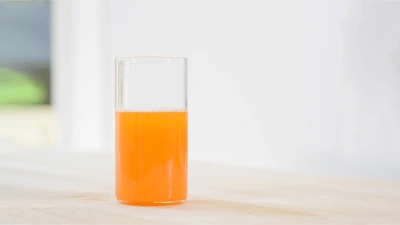Dietary fiber, also known as roughage or bulk, is the part of plant-based foods that your body cannot digest. Fiber is found mainly in fruits, vegetables, whole grains, and legumes. The daily recommended fiber intake is 28 grams.4
If you are experiencing occasional constipation, chances are that you’re not getting enough fiber from your diet. Occasional constipation is defined as those times when you have bowel movements less than three times per week. Since it may be challenging to get all your fiber from foods if you’re part of the roughly 90% of Americans who do not eat enough fiber,3 consider adding a fiber supplements like Metamucil to your diet.
First, let’s discuss how fiber can help occasional constipation. Spoiler: Not all fibers work the same for regularity!
There are two commonly recognized types of fiber – soluble and insoluble fiber.
Insoluble fiber
Insoluble fiber, when added into a liquid like water, does not mix. They remain separate and visible in your glass and speed up the passage of food through the stomach and intestines, adding to the bulkiness of stool.5 By increasing bulk, insoluble fiber speeds up your stool traveling through the colon, which helps with bowel movements.6
Soluble fiber
Soluble fibers mix into water, and can have different impacts based on other properties like viscosity and fermentation.
• Viscosity refers to whether or not the fiber thickens the liquid so it flows and moves differently.
• Fermentation refers to how the bacteria in our digestive tract interact with the fiber.
Some soluble fibers completely disappear in the glass, and you can barely tell they are present. These are soluble non-viscous fibers. Others, called soluble viscous fibers, mix throughout the liquid, but change the liquid to make it thicker so it flows differently. These soluble viscous fibers are the ones that have been shown to help with occasional constipation. They do this by increasing the water content in stool to soften it, and by providing bulk to move it through the digestive tract.
Now consider the impact of fermentation on fibers. Soluble non-viscous fibers tend to be fermented, or broken down. Once fermented, they are not present in the colon to deliver a regularity benefit. However, if the fermented fiber leads to an increase in the good bacteria present in our digestive tract, it is called a “prebiotic”, as is the case with inulin, the fiber in Metamucil Fiber Gummies.
Pro Tip: Not all fermented fibers specifically feed our good bacteria and can be called prebiotics.
It is important to note that although both soluble and insoluble fiber play slightly different roles, both can help with occasional constipation in their own way. Keep reading to learn more.
